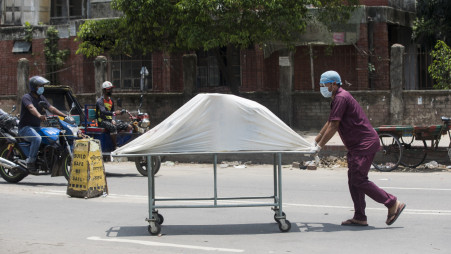A worrying spike in hazardous plastic waste during the pandemic
Fourteen thousand tonnes of hazardous single-use plastics have been produced in just one month. This includes surgical masks, polythene hand gloves, surgical hand gloves, polythene bags, and hand sanitiser bottles

Pandemic measures that limited human activity around the world have led to a lot of positive news about the environment. However, Bangladesh's capital Dhaka stands in stark contrast to this global reality.
The highly polluted Peruvian river Rimac runs crystal clear amid the coronavirus lockdown but our Buriganga does not. While lions are taking nap on empty roads of South Africa, Dhaka is still suffering from traffic congestions.
It has been all over the international media that nature is bouncing back, but Dhaka is yet to see much reflection of this. Dhaka remains the same as it was before.
The air quality of Dhaka this May showed continuous fluctuation. This month, Dhaka has so far had three days of moderate (51-100) air quality, nine days of unhealthy – for sensitive group (101-150) air quality, and one day of unhealthy (151-200) air quality.
Such unstable air quality indicates that Dhaka, unlike other cities, is not taking rest, and that it is producing waste incessantly. Recently, the Environment and Social Development Organisation (ESDO) has published some data on the spike of hazardous plastic waste during Covid-19 pandemic.
It showed that around fourteen thousand tonnes of hazardous single-use plastics have been produced in just one month. And, this includes surgical masks, polythene hand gloves, surgical hand gloves, polythene bags, and hand sanitiser bottles.
On an alarming note, Dhaka alone has contributed to producing around three thousand tonnes of medical waste. All these medical hazards in Dhaka city are being taken care of by PRISM Bangladesh Foundation since 2005.
PRISM is now collecting around 4.5 tonnes of medical hazards daily from different hospitals and incinerating them.
Unlike in other sectors, Bangladesh's preparation for waste management is not adequate. Even after two months of shutdown, the authorities concerned are yet to come up with a solid plan to this end.
Khondkar Anisur Rahman, executive director of PRISM Bangladesh Foundation said, "All the hazards that we are collecting are not segregated. We have asked hospital authorities to put contaminated hazards in bio-septic bags so that we can collect those easily, but they have been unable to do so, from the very beginning."
"Hence, we collect and incinerate all of them. People who collect them also have a life and we cannot risk their lives just for segregating waste."
AHM Abdullah Harun, executive engineer of waste management at the Dhaka South City Corporation, said he had taken this initiative of incineration.
This very thing is not going to hamper our environment much, he claimed, adding, "Other countries are also doing incineration and it is fine."
Shahriar Hossain, secretary general of ESDO, however, gave a different opinion. Few of the medical hazards, i.e. personal protective equipment, might contain dioxin and PVC and incinerating those might affect the environment badly, he said.
He, therefore, suggested separating the contaminated hazards and keeping those in sealed containers, till a permanent solution is found.

Medical hazards are collected from a few hospitals only. But a huge amount of medical hazards are produced from households as well. Harun expressed his concern over this and said, "Those hazards are directly dumped into the landfills and we cannot do anything until citizens become conscious about this."
Citizens are certainly not aware of the importance of segregating hazards. But the government has not taken any step to make them aware either. This could become a way to contaminate other sources and activate those as carriers too, Shahriar feared.
The government has been distributing relief among low-income people amid the shutdown. This is another reason behind the recent surge in the use of single-use plastics (SUP).
Concerned over this situation, Ziaul Haque, director of the Department of Environment (DoE), has officially requested the Ministry of Disaster Management and Relief to use cloth and jute bags instead of SUP bags in distributing relief goods.
"It is quite normal that people will use more SUP bags amid this pandemic. Nevertheless, law enforcers and the Dhaka City Corporations authorities should be prepared with plans to manage those wastes," suggested Syeda Rizwana Hasan, executive director of the Bangladesh Environmental Lawyers' Association.
All inspection to ban SUP by 2021 are on hold now. Ziaul said polythene producing factories and brickyards have reopened taking advantage of this situation.
As a result of this, the DoE is going to ask for a six-month extension to fulfil the goal. They are also working to formulate policies for segregating medical hazards, providing logistic supports to PRISM, way of collecting hazards and so as for the waste collectors.
According to ESDO, around 1,500 waste collectors have fallen sick during the coronavirus outbreak.
Manzur Hossain, chief waste management officer of the Dhaka North City Corporation, however, denied this claim and said there was no such record with them.
Rather, the Dhaka City Corporations has appointed more manpower to make Dhaka a cleaner city amid this shutdown, he claimed.



 Keep updated, follow The Business Standard's Google news channel
Keep updated, follow The Business Standard's Google news channel














